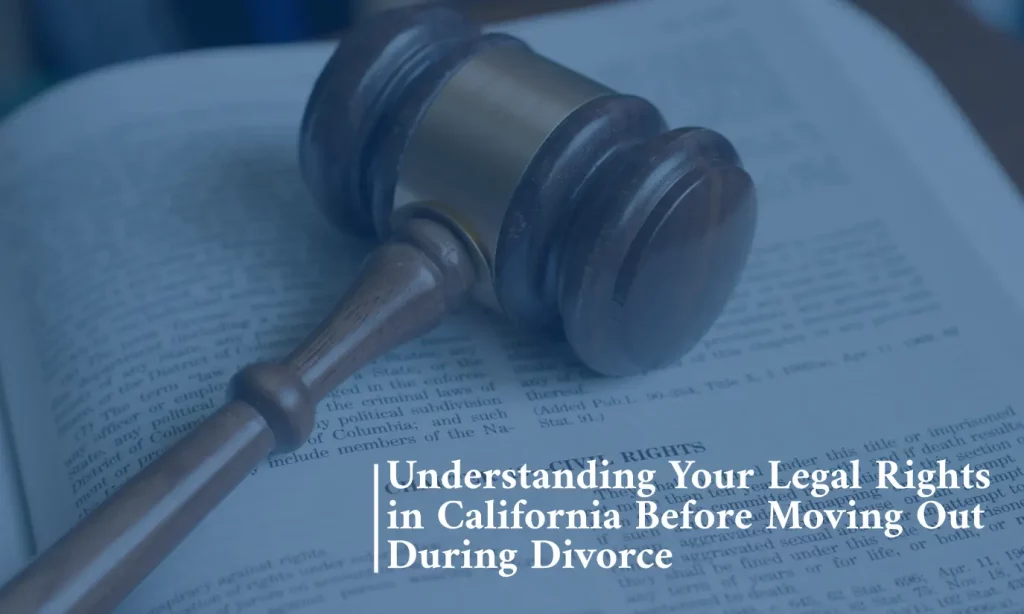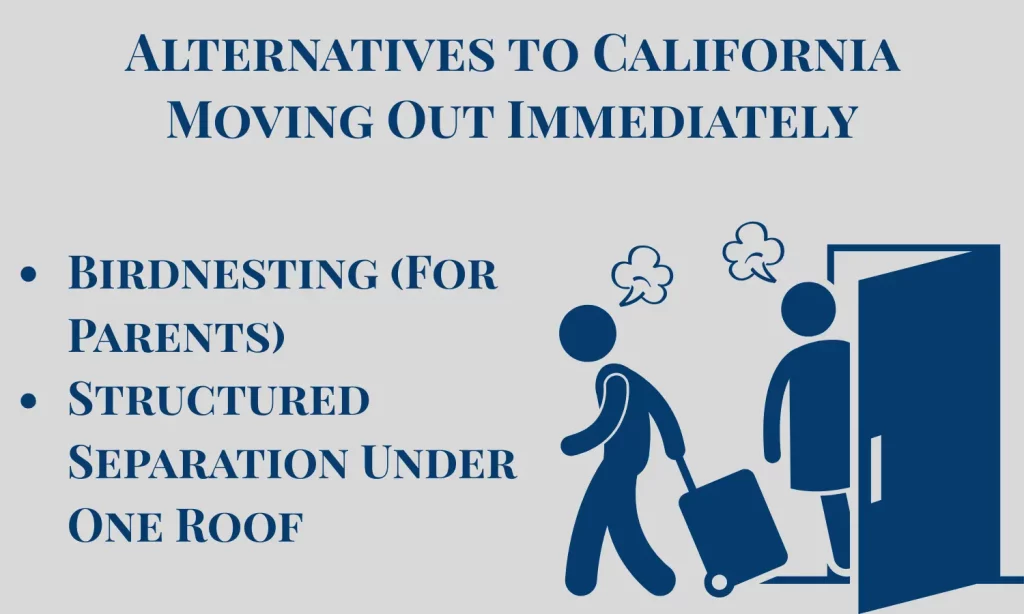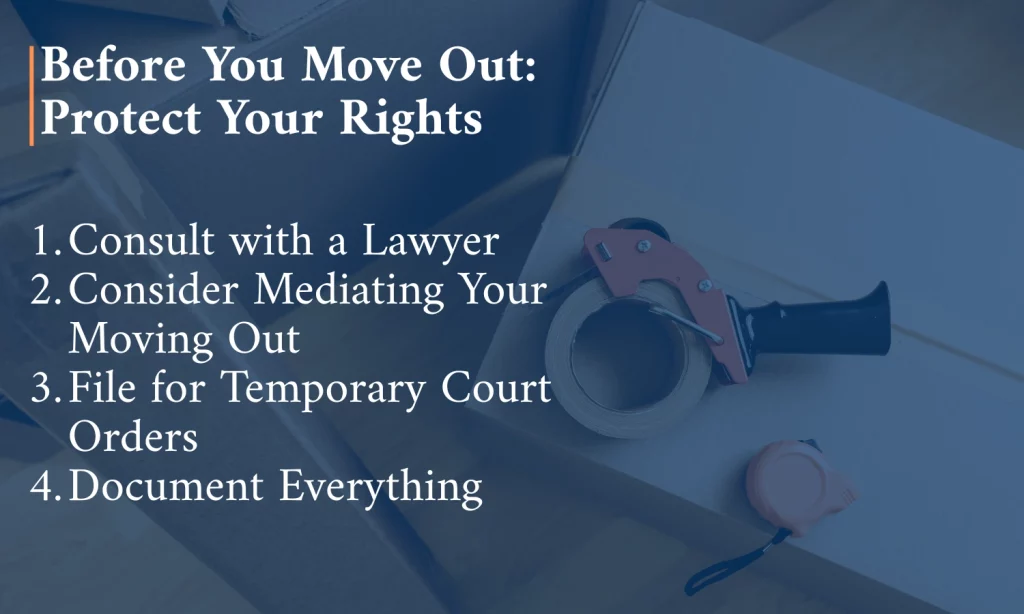Providing Divorce Mediation Services Throughout California
Providing Divorce Mediation Services Throughout California
Home » Divorce and Family law Blog » Move Out During Divorce in California? Legal Impact Explained

Dina Haddad and her team provide expert mediation services for Californians. If you want help related to any family law issue, call us or book a consult.
Choosing whether or not to stay, or to move out during a divorce, is an emotionally challenging and legally complex decision at the start of a separation or divorce process.
This is particularly relevant in California, and it can directly impact your custody arrangements, finances, and psychological health.
What if you want to leave to escape the constant fighting? Or do you stay to safeguard your stake in the marital home? If you have children, their involvement adds a layer of complexity to the decision.
It’s more than just changing a residence; it’s about navigating through one of the most difficult periods in a person’s life while making calculated decisions.
In this guide, Families First Mediation will walk you through exactly how moving out impacts your divorce, when it’s advisable to stay, and how to protect yourself legally if you need to go.
Schedule a FREE Moving out consult with California’s Super-Lawyer and expert mediator Dina Haddad for the best approach to leaving during a divorce!

California’s no-fault divorce laws do not require you to keep living in your marital home, but if you walk away without a plan, it may come back to haunt you. Here’s what you should know:
Neither spouse may change the locks, turn off utilities, or exclude access to shared areas of the home without a temporary court order for a jointly shared residence (joint title or joint lease).
If your spouse takes any of these actions, document it and contact your attorney right away.
A common misconception is that moving out results in abandoning your rights to the marital home. This is false. Just because one spouse moves out does not mean they forfeit their right to, at a minimum, 50% of equity accrued during the marriage in the home.
The spouse who moved out is still entitled to their community property rights, according to California’s community property laws.
In fact, staying in a family home can be expensive if you cannot afford the related bills or paying your spouse 50% of the fair market rent for the home.
Legal separation in California is handled similarly to divorce, but it does not dissolve your marriage. You will separate property and debt (under the community property laws) and will need to agree to child custody and/or child support.
The major difference, when compared to divorce, is you are still legally married. This may mean that you might be able to keep military benefits and health insurance for example.
Legal separation requires you to file the necessary documents with the court – merely separating or living apart does not count.
It should be noted that you cannot file for both legal separation and a divorce at the same time. Once the divorce has commenced, the court will not grant you a legal separation for the same marriage.

In California, leaving the marital home during a divorce can have serious legal consequences. The decision will affect everything from child custody to property rights.
Below, we will discuss the two most significant areas affected by moving out of the marital residence and provide expert-backed information on how to best protect your interests.
California courts place a strong emphasis on the importance of children’s stability during divorce. However, the courts also understand that separation is difficult and options can be very limited.
If you decide to move out, have an agreement with your spouse as to the custodial schedule.
If you cannot have your desired time, e.g. 50/50, given you are moving to your family’s house to save money, mention this in an email.
Stress that it is temporary and you do want your time but do not wish to disrupt the children’s schedule until you can find housing nearby or you both can reach an agreement for the future.
If you are leaving without an agreement to custodial time (even informally between the parents), you risk creating a “status quo” by default.
Courts can interpret this as acceptance of reduced parenting time. To protect your rights:
Even if safety issues are forcing you to leave your home, file for emergency custody orders on the same day as you leave or move with your children.
If you can, try your best to replicate your children’s routines (school, activities, etc….) to show a commitment to stability, which judges often consider when making decisions.
Related: Divorce and Children and Importance of Detailed Parenting Plan.
Although moving out does not legally terminate your property rights in California, moving does create practical difficulties.
The spouse remaining in the house can make a motion to get credit for mortgage payments they made after separation, which may be considered in the final disposition of assets.
While “abandonment” isn’t explicitly stated as a grounds for divorce in California, it can still have legal implications, particularly concerning spousal support and property division.
For example, tracking shared property or common household contents after leaving can be difficult.
In order to protect your interests, keep a record of all payments and property, as the Courts often consider these financial patterns when dividing marital assets.
Note: For high-value homes, consider a “buyout agreement” where one spouse assumes the mortgage or refinance the mortgage into their name alone. This can prevent forced sales during divorce.

Moving out of your marital home is not your only option in a divorce. Couples in California can typically benefit from transitional arrangements that reduce conflict while still preserving their legal rights.
Below we will discuss two structured approaches that offer stability to both children and finances while the divorce is underway.
Birdnesting or nesting, is a unique blending of roles in which the children stay in the family home and the parents take turns living there.
This option brings the least amount of disruption possible to kids’ lives and their school activities.
When done right, nesting can alleviate anxiety for children during the transition, as long as the parents maintain similar home rules and regulations between households.
However, birdnesting is highly dependent on cooperation:
The most successful birdnesting arrangements involve mediation to help parents establish some basic ground rules.
Families First Mediation, led by Dina Haddad, traditionally helps couples create nesting agreements that outline everything from grocery budgets to limits on how and where to house their new romantic partners during visitation days.
Birdnesting is not permanent, but it can be great for giving “some breathing room” to all parties while negotiating long-term arrangements without tearing the children from their home.
When moving out is not an option, couples can make it work by creating two homes in one house. Couples need to go beyond simply cohabitation and create separation using written agreements.
Basically, approach living together as a business to minimize conflict. There are some key things to separate:
We recommend making things clear and documenting this agreement. The signed separation agreement should clearly state how each couple deals with mortgage, chores, and even how guests will be handled.
This may feel awkward but it will keep one spouse from claiming the other abandoned them, as well as allow transparency on the couples’ assets in order to divide property.
Many couples use mediation to negotiate these terms to prevent emotions from escalating.
Need help creating a separation agreement? Expert Mediators like Dina Haddad at Families First Mediation provide neutral guidance tailored to your situation.

There are options, but sometimes there will be a compelling reason for you to leave the marital home. It may be because you have safety issues, your financial realities dictate it, or other reasons may contribute to having to leave your marital home.
In any case, once you have committed to leaving, you will want to take proactive steps to minimize impact as well as your risks.
Below are scenarios where you will be left with no option but to move, and how to protect your rights.
When a home is a toxic or dangerous environment, safety becomes the focus. In these types of cases, California courts are protective, giving support through actions such as emergency restraining orders (EVPOs), which allocate exclusive use of the home to the abused spouse.
According to the National Domestic Violence Hotline, you should record incidents using time and date stamps, photos of injuries, and statements from witnesses (if possible) before leaving. This documentation can be helpful for your legal proceedings.
For parents, leaving an abusive situation with your children adds special nuances. If you file for an emergency custody order at the same time, you won’t have to worry about your abuser accusing you of parental kidnapping.
Some shelters and agencies, like the California Partnership to End Domestic Violence, will provide transitional housing with safety and legal support.
Know that leaving an abusive situation can never be considered “abandonment” under California law.
No judge will penalize you for trying to keep you and your children safe. In fact, family law judges are concerned when a parent does not keep their children safe and does not look for means to protect the children.
Learn More: Reasons When Judge Will Modify Child Custody
Sometimes, there are financial pressures to move before divorce has been finalized. During the separation period, you may need to relocate for a job or your lease is ending – and finding a comparable lease in your area is just too expensive.
However, without the other parent’s agreement (make sure it’s in writing) or a court order, moving away risks losing custodial time.
The California courts have a complicated move-away process and only allows for moves if you have:
Our financial planners recommend submitting actual budgets showing that the move is a necessity, along with a proposed visitation schedule i.e. longer summer breaks if you are moving far.
Although not ideal, one can move away without the children without an agreement or court order.

Are you relocating during a divorce? Here are some steps to protect your rights in California:
A lawyer will assist you in understanding the impact of the move on property rights and custody. A lawyer will also assist you with temporary court orders that would protect you from financial loss, or disadvantage as a parent.
Families First Mediation provides mediation services to help you create binding agreements on bills, parenting arrangements, and access agreements to property.
Mediation is more efficient and faster than litigation, which can be adversarial, stressful, and expensive. You are more than likely to reach a binding agreement in mediation before you could obtain move away orders. Book a FREE Moving Out Consultation to explore the legal options.
Read More: When is Divorce Mediation Not Recommended?
If you are unable to reach an agreement with your spouse together or through mediation, you can file for temporary child custody, child support and spousal orders through the court.
However, the courts will not make move away orders on a temporary basis. Mediation is a better alternative.
Take pictures of the condition of the house. Make an inventory of your valuable things. Make sure you save financial statements.
Taking pictures and keeping records is a good way to protect yourself from a later false claim for damages or hidden assets.
Related: Moving out of State with Child and no Custody Agreement

Are you leaving during a divorce? Avoid these damaging mistakes that can impact your case:
When you move without filing custody orders, you allow the other parent to establish the “status quo” care, which can limit your long-term time with your children.
Always reach a written agreement with the other parent first. This can be an agreement you craft together, or one with the assistance of a divorce professional, as in mediation.
If you take all of the money from a joint bank account, it can quickly escalate your case. Remove only amounts you have agreed upon and document each transaction in detail.
Destroying belongings or your residence may worsen your position. The courts may order you to reimburse the cost of repairs, and you gain no favor with the courts which can be relevant when deciding future issues.
In California, community property laws give no guarantees about the rights to the house, and without a written agreement, the court can order the house to be sold. A consultation with an attorney-mediator is advisable.
A common myth is that California automatically declares couples divorced after they have been separated for a while.
That is untrue as there is no automatic divorce after separation. To dissolve your marriage, you need to file the appropriate paperwork with the California courts.
A little preparation can help you avoid delays, added costs, and poor results.
Read More: Does It Matter Who Files for Divorce First in California?
Moving out during a California divorce is one of the most important decisions you’ll make. Your decision impacts the future options available to you as well as the costs. ,
The most important part of moving out is being prepared. Obtain written agreements and create good documentation. If you are moving out of necessity and fear for your personal safety, you should obtain immediate legal protections.
For high conflict situations, you should consider emergency orders to get some immediate relief from the court.
For lower conflict situations, mediation can allow both parties to reach a fair solution that benefits both parties financially and emotionally, and usually much faster than the court system.
Schedule a FREE divorce mediation consultation with Families First Mediation for the best solution for your situation!
No, both spouses have equal rights to the marital home until a court order stating otherwise. Lockouts are illegal; keep any logs regarding any attempts, and contact your attorney immediately.
It could. If you earn less than your spouse, moving out before temporary orders are in place could impact your ability to claim housing costs. File for spousal support before moving out to protect your rights.
Not necessarily. The courts understand that living together after separation is very difficult.
However, the courts are also looking to see that the parent that moved out is doing their best to have their custodial time with their children.
The courts understand that some moves are temporary in nature and the parent is not abandoning their children. To be safe, document these points in an email to the other parent.
You can take your things, but it has to be reasonable. You are not stripping the home.
Take pictures/videos and document what you take and avoid items that are in dispute (heirlooms, joint electronics) until agreements are formalized.
The courts have not established mileage, but it can be just several miles, especially if it impacts the children’s ability to be at their school or in their school district.
If it’s considered a move away, the parent must either have court approval or the other parent’s written consent.
A request for a “move-away” is very hard and often requires a trial to show the relocation benefits the children (better schools, family support).
Most counties in California require custody mediation prior to any custody hearings. However, this is court ordered mediation.
For move-aways, given the complex trial requirements, it’s best to mediate these issues to save time and money.
Families First Mediation can assist in negotiating fair terms of property, parenting, and expenses, preventing costly court battles later.